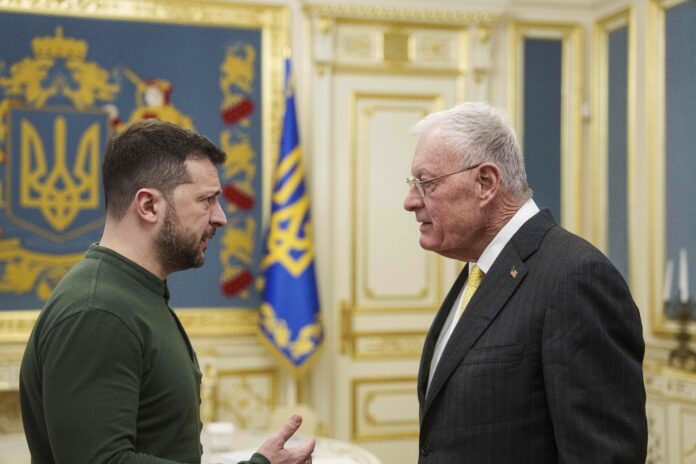Donald Trump appears to have secured a major victory in his trade negotiations with Volodymyr Zelensky, as the Ukrainian president is reportedly preparing to sign a deal granting the US access to Ukraine’s critical mineral deposits.
Ukraine caves under pressure
The agreement is seen as key to Washington’s broader push for a peace settlement between Ukraine and Russia, which would bring an end to the three-year war. Just days ago, Zelensky had insisted he would never “sell out” Ukraine, making his apparent reversal all the more striking.
Zelensky confirmed on Friday that officials from both countries were finalizing an economic agreement, aiming for a fair deal for Kyiv. Trump also signaled that negotiations were nearing completion, telling reporters in the Oval Office that the agreement could be signed “in the next fairly short period of time.”
High-stakes negotiations and tensions
The Wall Street Journal reported that the deal was imminent, coming after tense talks in which Zelensky reportedly frustrated Trump and his team, which included JD Vance, Marco Rubio, Treasury Secretary Scott Bessent, and National Security Advisor Michael Waltz. At one point, Trump allegedly threatened to cut off all US aid to Ukraine.
Zelensky’s rejection of an earlier version of the deal on February 15, calling it “not in the interests of a sovereign Ukraine,” only worsened tensions. His public complaints about US-Russia negotiations in Saudi Arabia, which excluded Ukraine, further angered Trump, who later mocked Zelensky as a “moderately successful comedian turned dictator.”
Kellogg’s role in finalizing the deal
The breakthrough reportedly came after retired Lt. Gen. Keith Kellogg, Trump’s envoy to Ukraine, met with Zelensky in Kyiv. Despite earlier criticism from Trump for being “too pro-Zelensky,” Kellogg played a key role in convincing the Ukrainian leader to move forward with the deal.
Following their meeting, Zelensky praised Kellogg, saying his work “restores hope.” Sources close to Kyiv said the former general’s diplomatic approach and public praise of Zelensky helped get the deal over the line.
US strategy: minerals for aid
Trump has long argued that Ukraine should compensate the US for the billions in aid it has received over the past three years. He suggested that Ukraine could begin repaying the US with $500 billion worth of critical minerals, a resource the American economy depends on for industries like clean energy and tech manufacturing.
The push for access to Ukraine’s rare earth minerals has been in motion for months. Last fall, Republican Senator Lindsey Graham visited Kyiv and suggested that Ukraine’s mineral reserves could be leveraged as a way to strengthen economic ties with the US.
The fine print raises concerns
The proposed contract, according to a draft reviewed by The Telegraph, not only covers mineral rights but also oil, gas, ports, and infrastructure, raising concerns about how much control Ukraine would retain over its own resources. The agreement would also be governed by New York law, giving the US first refusal rights on future mineral exports.
Some in Ukraine have warned that the deal could have long-term economic consequences. Analysts comparing the agreement’s terms to post-World War I reparations on Germany suggest that Ukraine’s financial obligations could be even higher than those imposed on Germany under the Treaty of Versailles.
What’s next for Ukraine?
Despite concerns, Ukraine’s leadership appears ready to sign, with Zelensky now focused on securing additional security guarantees from the US and its allies as part of any final settlement.
With the deal expected to be finalized in the coming hours, it marks a significant shift in US-Ukraine relations and a major step toward Trump’s goal of reshaping America’s role in the conflict.




